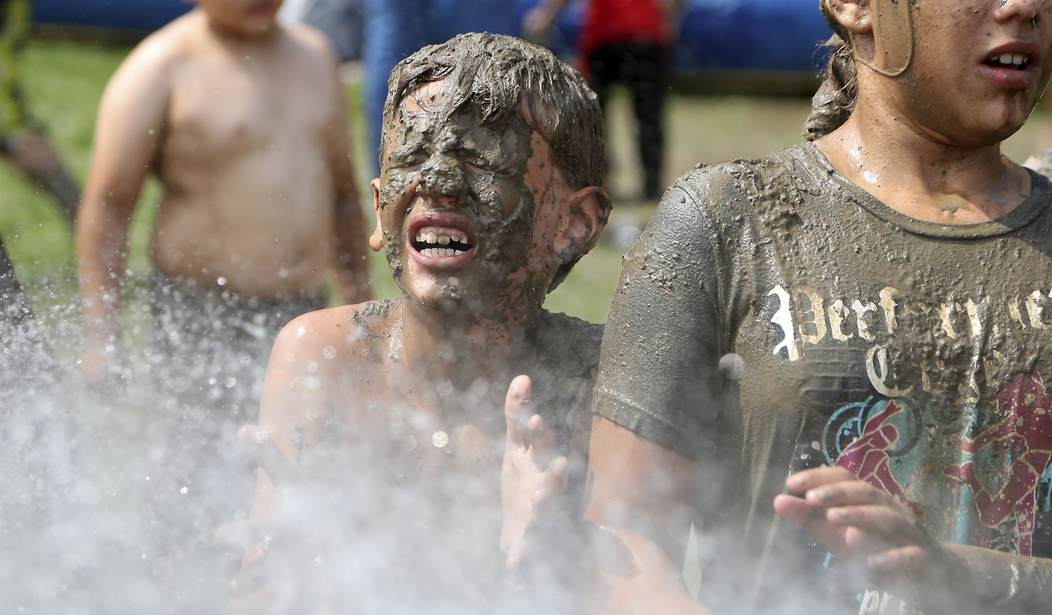When I was six my best friend and I would get up on Saturday morning, meet up on our bikes and challenge ourselves to ride to a some street or area we’d never seen before. Now at age six we weren’t traveling terribly far but we really did try to push the limits until we were somewhere unfamiliar, even if that was only 5-6 blocks away. Our parents wouldn’t see us for an hour or two and they didn’t seem to care. Again, we were in 1st grade at the time. I really think a parent who did this now would be in danger of having the police called on them but in the 70s this was pretty normal.
I had another friend whose house backed up to a forested area where people would dump things they didn’t want to take to an actual dump. Toby and I would build forts out of old freezers and appliances and whatever pieces of rusty metal had been left out there. We were seven. It’s a wonder we both didn’t get tetanus.
All of that came back as I read this NY Times opinion piece today.
I’ve written a bunch of times about the teen mental health crisis which is pretty widely acknowledged at this point. Where people vary is on isolating the factors causing the crisis. Some argue it’s directly connected to cell phones and social media. And the timing of the crisis does seem to match up pretty well with the adoption of smart phones by teens. But others argue there’s not enough evidence to reach that conclusion, at least not yet.
Deciding why this is happening is critical if you want to address it. If smart phones and social media are to blame then parents may need to think about keeping them away from younger teens or starting them on phones later. Obviously if social media isn’t the source of the problem then denying phones to kids won’t help at all.
Yesterday the NY Times published an opinion piece co-written by a psychologist and a mom who wrote a book titled “Free Range Kids.” The argument they are making is somewhat counterintuitive: Maybe these troubled teens are struggling because they’ve been watched over too carefully by their parents. Maybe what they need is to learn to care for themselves more without adult intervention.
as kids’ freedom has been going down, their anxiety has been shooting up. The surgeon general has declared this “the crisis of our time.” As a society, we’ve been trying everything from breathing exercises to therapeutic horse grooming to keep kids from shrinking from life.
While there could be many reasons our kids are suffering, what if the problem was simply that kids are growing up so overprotected that they’re scared of the world?…
We think this constant supervision and intervention could be hurting kids’ chances to become brave and resilient, and a recent Journal of Pediatrics article concurred. What’s missing today isn’t just the thrill of climbing trees or playing flashlight tag. It’s that when an adult is always present — in person or electronically — kids never really get to see what they’re made of. Kids should have a loving and secure relationship with their parents, of course. But if you think back to a time you were alone as a child and got lost or maybe fell off your bike, you probably still remember what happened next. You limped all the way home or asked a stranger for help. Youmanaged. And that was a milestone.
The psychologist who co-authored the piece decided to test it. He asked a half dozen patients age 9-14, all of whom were struggling with anxiety, what things they would like to try on their own. After five visits (Zoom or in person) with a parent present, the kids went out and tried 10-20 things by themselves.
The result was that all five children went from saying they felt worried most of the time to saying they felt worried a little bit of the time.
Statistically, this independence therapy worked better than drugs. And faster than cognitive behavioral therapy.
This was just a pilot study involving a handful of kids but the results were positive enough that the psychologist is now planning a larger trial.
If you’re like me you’re automatically suspicious of miracle cures for things like childhood anxiety. Still, this really does make a certain sense and it wouldn’t surprise me if it worked for a lot of kids. I really don’t see any alternative for kids to become independent except by letting them do things on their own. And getting kids outside doing something would also keep them off their phones for a little while. It seems like a win-win.







Join the conversation as a VIP Member